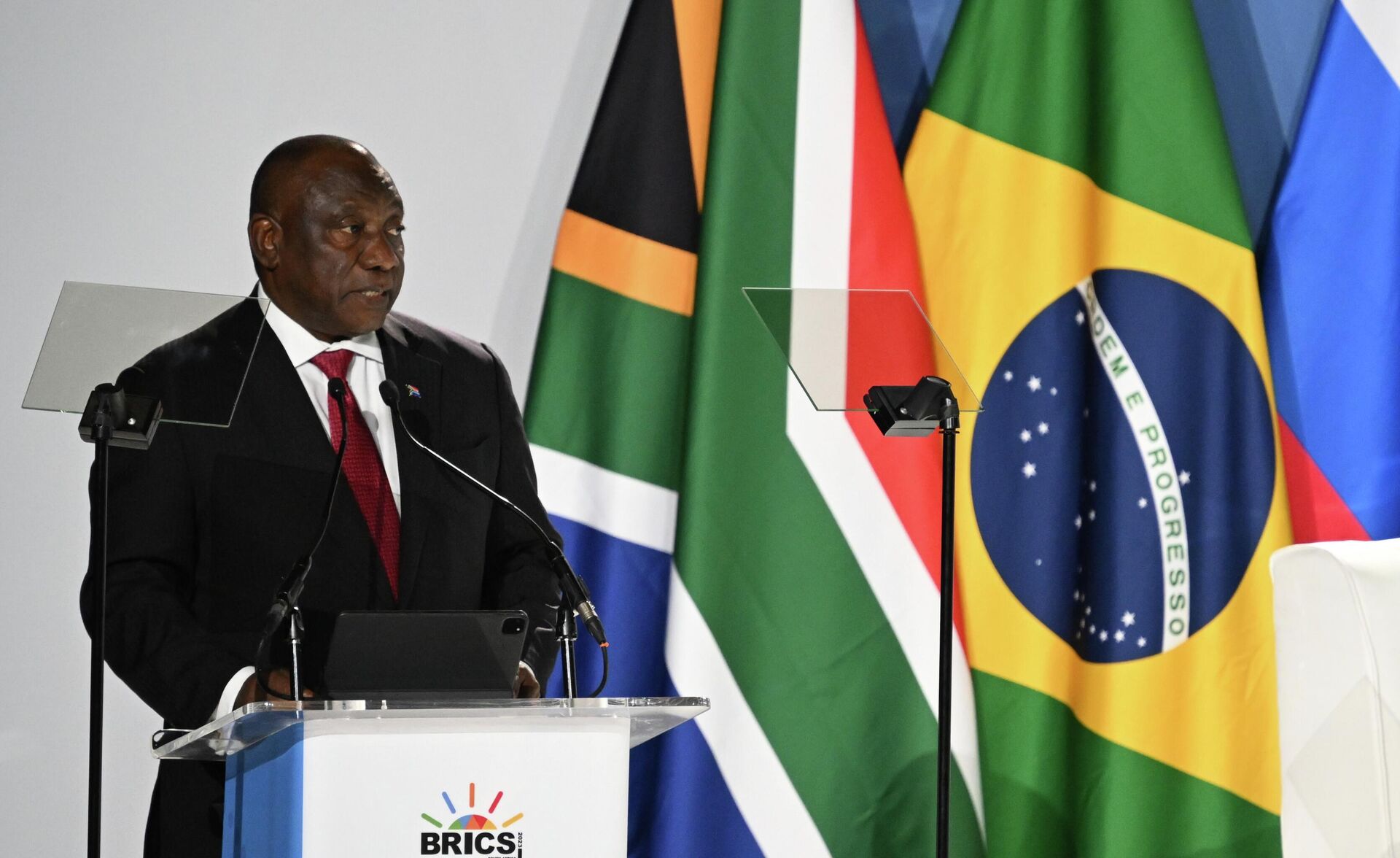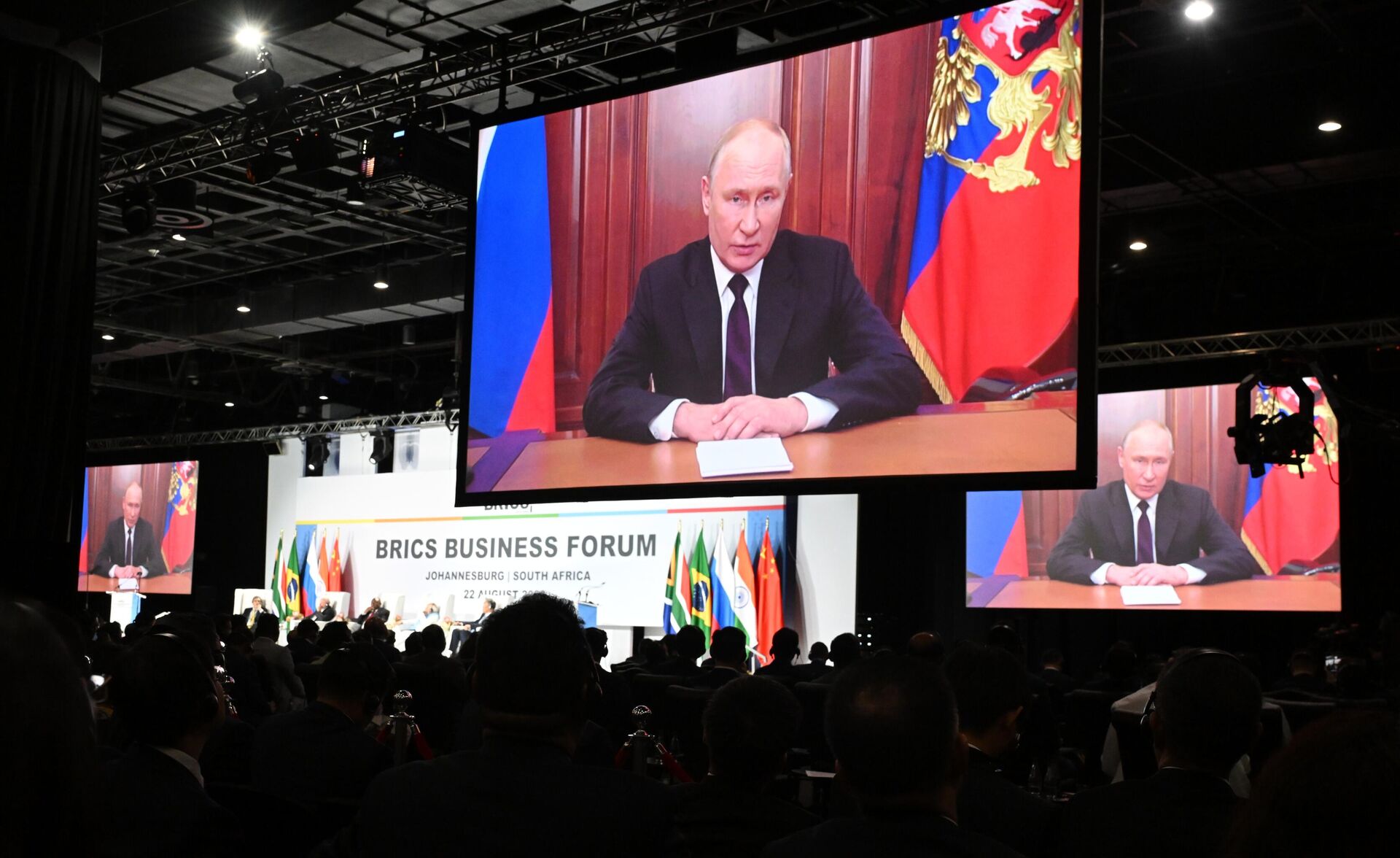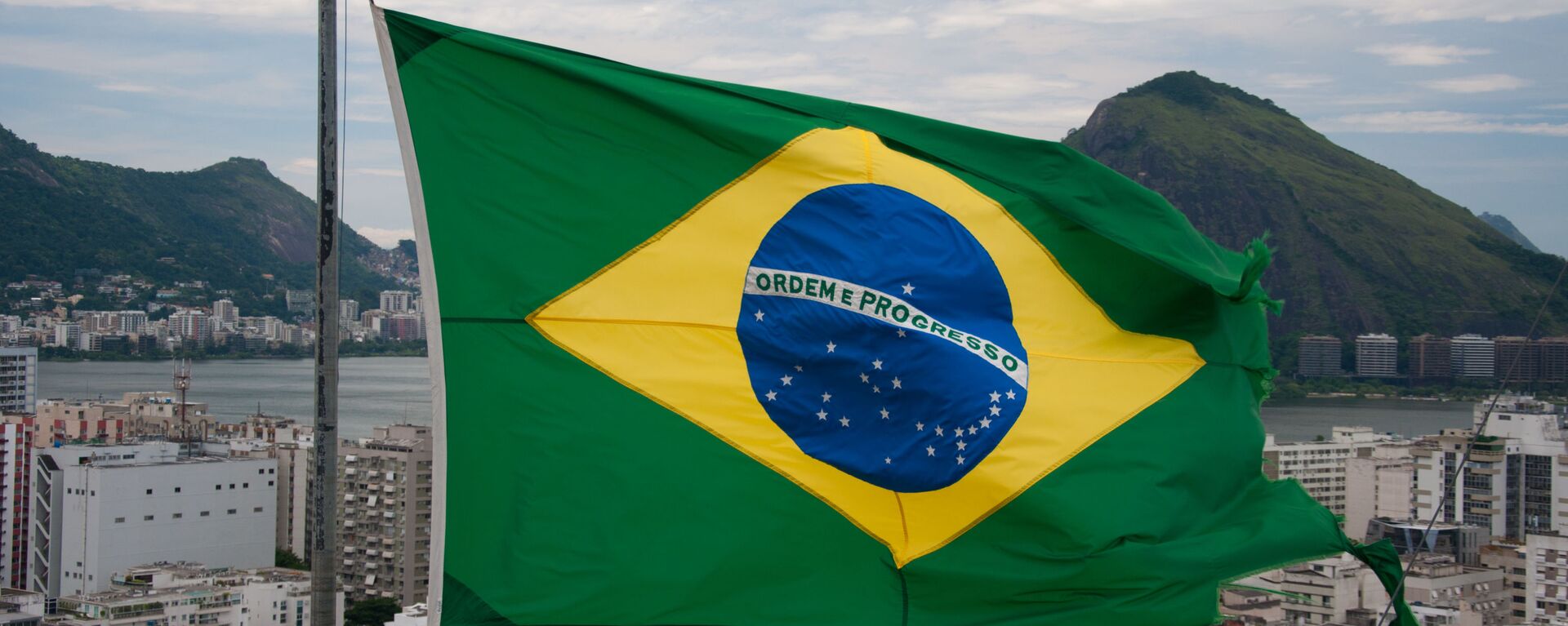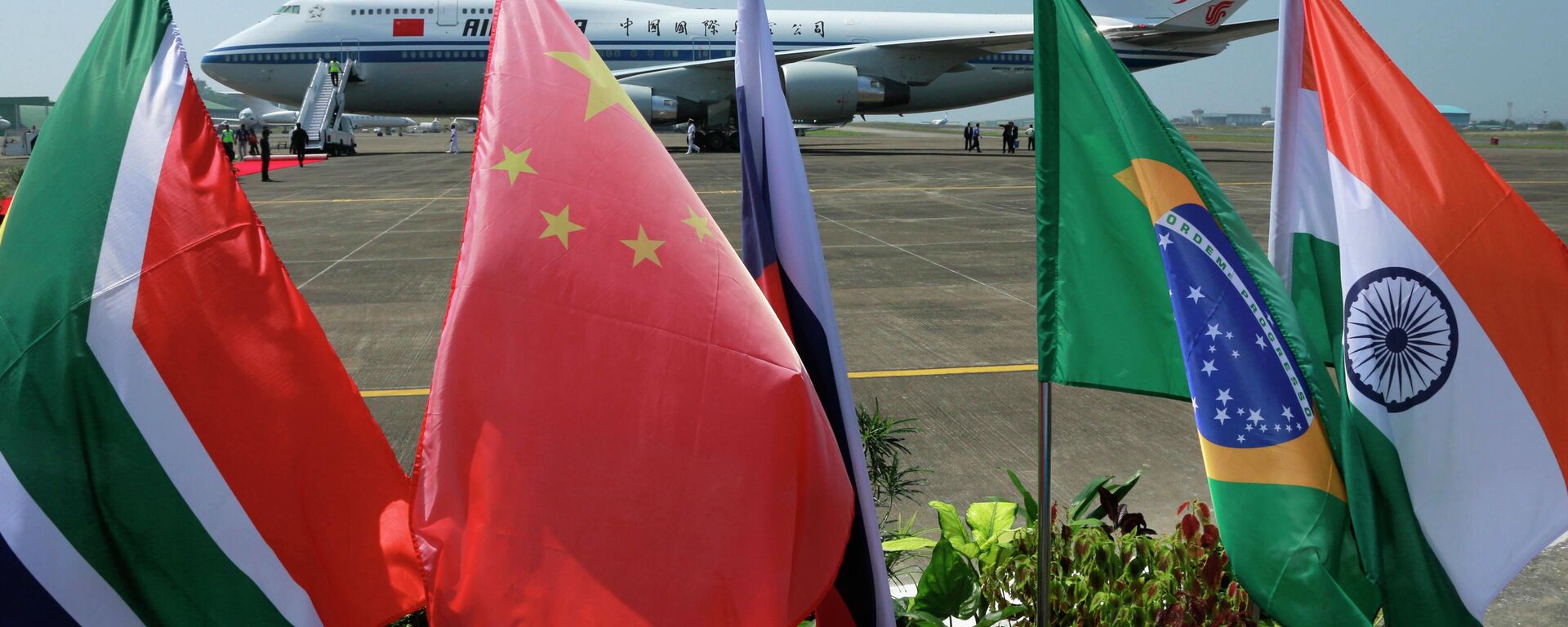https://sputnikglobe.com/20230822/leaders-speeches-show-high-degree-of-consolidation-and-unanimity-within-the-brics-1112797963.html
Leaders' Speeches Show High Degree of Consolidation and Unanimity Within BRICS
Leaders' Speeches Show High Degree of Consolidation and Unanimity Within BRICS
Sputnik International
Leaders from Brazil, Russia, India, China and South Africa delivered their speeches at the first day of the BRICS Summit 2023 in South Africa's Johannesburg.
2023-08-22T19:25+0000
2023-08-22T19:25+0000
2023-08-23T16:01+0000
russia
brics summit 2023
brics
cyril ramaphosa
lula da silva
vladimir putin
brazil
china
world trade organization (wto)
wto
https://cdn1.img.sputnikglobe.com/img/07e7/08/17/1112807364_0:120:2297:1412_1920x0_80_0_0_21e04d94681037cb192ea8f4ab324bbb.jpg
On the first day of the summit, the leaders of BRICS member states addressed the gathering outlining their vision for the group's future and pressing issues faced by the international community. Participating officials include: President Cyril Ramaphosa of South Africa, who chairs the group in 2023; Brazil’s President Luiz Inácio Lula da Silva; Russian President Vladimir Putin, who participated in the summit via video link; Indian Prime Minister Narendra Modi; and Minister of Commerce of the People’s Republic of China Wang Wentao, who delivered a speech on behalf of Chairman Xi Jinping.Cyril Ramaphosa: South Africa Presents Immense Opportunities for InvestmentThe president of South Africa placed an emphasis on BRICS' capability of forging stronger ties between nations over 15 years of the group's cooperation based on the principles of inclusiveness, transparency and developmental agenda.Per Cyril Ramaphosa, the group has long been a vital and vibrant mechanism for ensuring inclusive economic growth and development that helped transform the global economy. Ramaphosa highlighted that, today, the group accounts for a quarter of the global economy and a fifth of global trade, noting BRICS is nothing short of an engine for global growth.BRICS also accelerated intra-trade and connectivity over the past decade, according to the South African leader, who particularly hailed the role of the New Development Bank (NDB) created by the organization's member states in 2015. Ramaphosa highlighted the bank was established to mobilize resources for infrastructure and sustainable development projects in emerging markets "without conditionalities", in a clear reference to the politicized aid provided by Western financial institutions which force its borrowers to champion the Western political and economic agenda.Ramaphosa also condemned those countries which have recently embraced unilateral protectionist measures in open defiance of the World Trade Organization (WTO) rules.The South African president emphasized his country as well as other nations of the African continent are facing pressing issues of inequality and poverty. However, at the same time, Africa possesses massive untapped potential by being rich in natural resources, including precious metals and rare earth minerals indispensable for the global economic development in the 21st century, as well as human resources. Ramaphosa further highlighted South Africa and countries of the region are open for investments and cooperation in the field of exploration of the continent's treasures, adding, however, that Africans are interested in domestic procession and exporting of finished products, not just raw materials.Per Ramaphosa, Africa is ready to implement infrastructural projects, accelerate digitalization of the continental economy, develop telecom networks, renewable energy and agricultural endeavors. The continent's deep local capital market, diverse economy, skills and industrial clusters could help catapult BRICS economies to a new level in the future, according to the South African president's vision.Lula da Silva: New Reference Unit for BRICSPresident of the Federative Republic of Brazil Luiz Inácio Lula da Silva highlighted the pace of BRICS economic growth in his speech, drawing attention to the fact that the group has already surpassed the Group of Seven (G7) in terms of GDP, based on purchasing power parity (PPP). In 2023, BRICS is estimated to account for about 31.5% of global GDP (PPP), while the share of the group of major industrialized nations comprising the G7 has been projected to fall to 30%.Having said that Brazil is doubling down on fighting poverty and kicking off new infrastructure projects (with the special emphasis on green energy), Lula stressed that sustainable development of any nation requires "political, social and legal certainty" in the way the world economy operates.To that end, BRICS is considering the creation of "a new reference unit" to shield their trade from major reserve currencies volatility.The Brazilian president also highlighted the need to switch to local currencies in mutual settlements to ensure fairer and more predictable trade, emphasizing the growing role of the New Development Bank as a vehicle for this shift.Lula also announced Brazil was returning to Africa, as his predecessor significantly reduced trade and financial cooperation between the continents. What's more important, Silver offered Brazil's know-how for "tropical agriculture" that could be replicated on the African continent to ensure its food security and make it an agricultural powerhouse given its 75% of arable lands.Putin: Russia to Provide Food and Energy Security, New Logistic RoutesPresident of the Russian Federation Vladimir Putin delivered a video address to the participants of the BRICS forum in which he particularly highlighted the role of BRICS in social-economic growth and sustainable development of the world's emerging markets.The Russian president referred to the unfolding financial volatility and inflation curbs partially created by irresponsible money-printing by some Western countries. He condemned the West for illegitimate sanctions, pressure and violation of all established rules of trade, which resulted in the increased unemployment, deficit of resources, inequality and soaring food and energy prices. Against this backdrop, BRICS' activities have already brought tangible results by launching new infrastructure projects, offering support to poorest nations and conducting policies in the interests of the "global majority".Putin reflected on why Russia withdrew from the Black Sea Grain Deal, which did not meet its goal of feeding the poorest nations, and emphasized the country is ready to provide the Global South with foods both on commercial and free bases. He also committed to provide six African countries, namely Burkina Faso, Zimbabwe, Mali, Somalia, the Central African Republic and Eritrea, with 25-50 thousand tons of grain free of charge. He added that in 2022, Russia managed to export 11.5 million tons of grain despite financial and logistic hurdles created by illegal Western sanctions, adding that in 2023 Russia has already delivered 10 million tons of grain to the global market.In addition to food security projects spearheaded by Russia, the president also singled out the nation's efforts in the field of energy security within the climate change agenda, stressing that Russia is capable of delivering not only traditional fuels but has mastered itself in green energy sources including gas, hydro- and atomic power stations.Having noted that BRICS has already outpaced G7 in terms of global economic growth (PPP), Putin stressed the group has taken course on de-dollarization, adding that the share of the dollar settlements within the group in 2022 fell to 28.7%. The Russian president highlighted that BRICS countries are increasingly shifting to national currencies.The president also placed emphasis on Russia's two major long-term logistic projects - the Northern Sea Route (NSR) and the International North–South Transport Corridor (INSTC) which could not only improve connectivity of the Eurasian continent but also reinvigorate Africa-Eurasia ties.Narendra Modi: New India of FuturePrime Minister of the Republic of India Narendra Modi praised BRICS as a new viable hub for the global economy, stressing that the group helps overcome emerging economic challenges.He further noted that India has managed to transform crises into new opportunities, citing the challenges posed by the COVID pandemic. Modi projected the country will become a $5 trillion economy sometime between 2026 and 2027. Today, India is already the fifth-largest economy in the world.Modi particularly referred to the nation's successes in the field of digitalization, stressing that the country has the lowest mobile data prices in the world. India's digitalization and the creation of unified payment interface (UPI) helped to facilitate local business and link the countries metropolises to rural areas and reinvigorated small and medium businesses, per the prime minister. In addition, India's digitalization experience proved efficient in rooting out red tape and corruption, boosted investor confidence and transparency, and paved the development of new technologies.The Indian prime minister declared the aim of creating a 'New India of the Future', stressing the country is making great progress in terms of new infrastructure projects, renewables and semiconductor industries.Xi Jinping: Shared Future of HumankindMinister of Commerce of the People’s Republic of China Wang Wentao delivered remarks by Chairman Xi Jinping, underlining Beijing's vision for the world's development and prosperity based on the idea of a shared future for all humanity.Xi sees BRICS as a positive force for growth in contrast to the West's hegemonic approach. The Chinese leader stressed hegemonism is "not in China's DNA", and that the country strives to be on the right side of history.Per Xi, the idea of dichotomy between "democratic" and "authoritarian" countries is detached from reality and could lead to further divisions in the world and potential clashes. The Chinese leader noted the world is facing a choice between peace and stability on the one hand, and a new Cold War on the other; between true inclusiveness and hegemony of some nations. Per Xi, hegemonism contains and disrupts development, violates the nation's right for prosperity and sovereign development.China has learnt lessons of the two World Wars and Cold War well, according to Xi, and therefore it rejects the new "bloc" mentality and yoke of colonialism, while embracing win-win cooperation, universal security, global peace and diversity in which different civilizations are flourishing together. The Chinese leader particularly cited the nation's Global Security Initiative. The Chinese chairman particularly hailed the idea of BRICS expansion, stressing that 20 countries have already applied for membership and many more are welcome to join in order to facilitate mutual development. For its part, China is open for cooperation with its vast market and unique investment opportunities. Per Xi, China is ready to contribute more for the world and will not be curtailed on its path to a common bright future.What's Behind the Messages of World Leaders?The 15th BRICS Summit kicked off in the South African capital of Johannesburg on August 22, becoming the largest-ever gathering of foreign leaders and representatives from the world's emerging economies. This year, the invitation to attend the summit has been extended to 67 heads of countries, including 53 from Africa, as well as Cuba, Bolivia, Bangladesh, Indonesia and Iran, among the others.BRICS is an acronym for Brazil, Russian Federation, India, China, and South Africa, which together represent over 40% of the world's population and over 31% of the GDP. The nations are expected to discuss the expansion of BRICS – as more than 40 states expressed desire to join the club with over 20 countries having officially applied for BRICS membership – the switch from the US dollar to national currencies in mutual financial operations, new business opportunities, infrastructure development and global geopolitics.
https://sputnikglobe.com/20230821/south-africa-receives-over-5bln-from-brics-bank-for-infrastructure-projects-1112747882.html
https://sputnikglobe.com/20230718/brazil-wants-to-use-national-currencies-in-trade-with-key-partners---foreign-minister-1111957649.html
https://sputnikglobe.com/20230822/xi-china-ready-to-elevate-strategic-partnership-with-south-africa-to-new-level-1112793588.html
https://sputnikglobe.com/20230821/whats-on-brics-2023-summit-agenda-1112763589.html
russia
brazil
china
south africa
Sputnik International
feedback@sputniknews.com
+74956456601
MIA „Rosiya Segodnya“
2023
News
en_EN
Sputnik International
feedback@sputniknews.com
+74956456601
MIA „Rosiya Segodnya“
Sputnik International
feedback@sputniknews.com
+74956456601
MIA „Rosiya Segodnya“
brics summit 2023, brics, brics 2023 summit, brics 15th summit, vladimir putin, xi jinping, narendra modi, wang wentao, lula da silva, cyril ramaphosa, south africa, hegemony, inclusiveness, shared future of humanity, brics gdp, g7 gdp, brics economic growth, africa, rare earths, instrastruture projects, brics development, food security, energy security, digitalization, climate change, green energy, leaders' speeches at brics 2023
brics summit 2023, brics, brics 2023 summit, brics 15th summit, vladimir putin, xi jinping, narendra modi, wang wentao, lula da silva, cyril ramaphosa, south africa, hegemony, inclusiveness, shared future of humanity, brics gdp, g7 gdp, brics economic growth, africa, rare earths, instrastruture projects, brics development, food security, energy security, digitalization, climate change, green energy, leaders' speeches at brics 2023
On the first day of the summit, the leaders of BRICS member states addressed the gathering outlining their vision for the group's future and pressing issues faced by the international community.
Participating officials include: President Cyril Ramaphosa of South Africa, who chairs the group in 2023; Brazil’s President Luiz Inácio Lula da Silva; Russian President Vladimir Putin, who participated in the summit via video link; Indian Prime Minister Narendra Modi; and Minister of Commerce of the People’s Republic of China Wang Wentao, who delivered a speech on behalf of Chairman Xi Jinping.
Cyril Ramaphosa: South Africa Presents Immense Opportunities for Investment
The president of South Africa placed an emphasis on BRICS' capability of forging stronger ties between nations over 15 years of the group's cooperation based on the principles of inclusiveness, transparency and developmental agenda.
Per Cyril Ramaphosa, the group has long been a vital and vibrant mechanism for ensuring inclusive economic growth and development that helped transform the global economy. Ramaphosa highlighted that, today, the group accounts for a quarter of the global economy and a fifth of global trade, noting BRICS is nothing short of an engine for global growth.
BRICS also accelerated intra-trade and connectivity over the past decade, according to the South African leader, who particularly hailed the role of the New Development Bank (NDB) created by the organization's member states in 2015. Ramaphosa highlighted the bank was established to mobilize resources for infrastructure and sustainable development projects in emerging markets "without conditionalities", in a clear reference to the politicized aid provided by Western financial institutions which force its borrowers to champion the Western political and economic agenda.
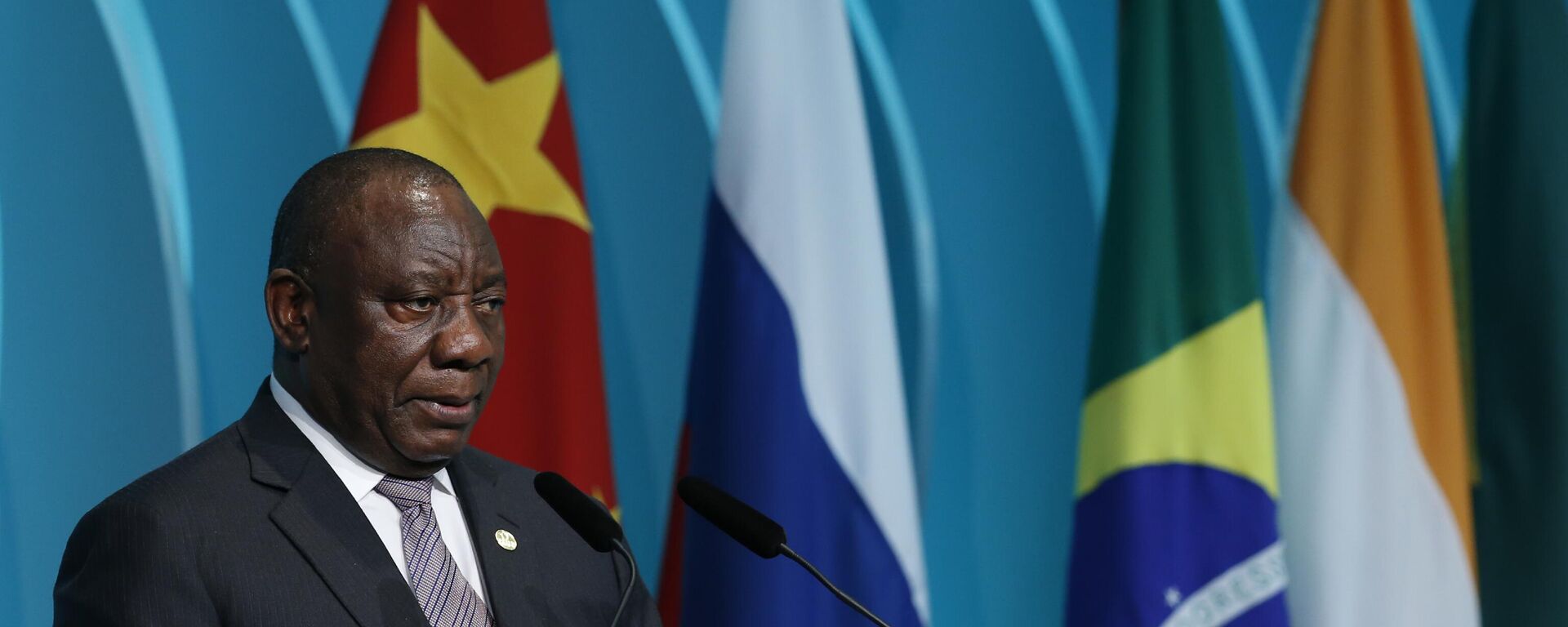
21 August 2023, 05:22 GMT
Ramaphosa also condemned those countries which have recently embraced unilateral protectionist measures in open defiance of the World Trade Organization (WTO) rules.
The South African president emphasized his country as well as other nations of the African continent are facing pressing issues of inequality and poverty. However, at the same time, Africa possesses massive untapped potential by being rich in natural resources, including precious metals and rare earth minerals indispensable for the global economic development in the 21st century, as well as human resources. Ramaphosa further highlighted South Africa and countries of the region are
open for investments and cooperation in the field of exploration of the continent's treasures, adding, however, that Africans are interested in domestic procession and exporting of finished products, not just raw materials.
He also emphasized the role of the African Continental Free Trade Area (AfCFTA), a free trade area encompassing most of Africa, which provides unique opportunities for BRICS countries and other world players.
AfCFTA is by far the world’s largest free trade area, bringing together the 55 countries of the African Union (AU) and eight (8) Regional Economic Communities (RECs). It particularly envisages the creation of a single market with a population of 1.3 billion and a combined gross domestic product (GDP) of about $3.4 trillion.
Per Ramaphosa, Africa is ready to implement infrastructural projects, accelerate digitalization of the continental economy, develop telecom networks, renewable energy and agricultural endeavors. The continent's deep local capital market, diverse economy, skills and industrial clusters could help catapult BRICS economies to a new level in the future, according to the South African president's vision.
Lula da Silva: New Reference Unit for BRICS
President of the Federative Republic of Brazil Luiz Inácio Lula da Silva highlighted the pace of BRICS economic growth in his speech, drawing attention to the fact that the group has already surpassed the Group of Seven (G7) in terms of GDP, based on purchasing power parity (PPP). In 2023, BRICS is estimated to account for about 31.5% of global GDP (PPP), while the share of the group of major industrialized nations comprising the G7 has been projected to fall to 30%.
Having said that Brazil is doubling down on fighting poverty and kicking off new infrastructure projects (with the special emphasis on green energy), Lula stressed that sustainable development of any nation requires "political, social and legal certainty" in the way the world economy operates.
To that end, BRICS is considering the creation of "a new reference unit" to shield their trade from major reserve currencies volatility.
Lula's notion is a reference to the idea of the group's common currency that got its second wind after the US weaponization of the dollar over the Russian special military operation in Ukraine, as well as the Federal Reserve's aggressive interest rate hikes which shattered the world's economy hurting vulnerable global borrowers.
The Brazilian president also highlighted the need to switch to local currencies in mutual settlements to ensure fairer and more predictable trade, emphasizing the growing role of the New Development Bank as a vehicle for this shift.
Lula also announced Brazil was returning to Africa, as his predecessor significantly reduced trade and financial cooperation between the continents. What's more important, Silver offered Brazil's know-how for "tropical agriculture" that could be replicated on the African continent to ensure its food security and make it an agricultural powerhouse given its 75% of arable lands.
Putin: Russia to Provide Food and Energy Security, New Logistic Routes
President of the Russian Federation Vladimir Putin delivered a video address to the participants of the BRICS forum in which he particularly highlighted the role of BRICS in social-economic growth and sustainable development of the world's emerging markets.
The Russian president referred to the unfolding financial volatility and inflation curbs partially created by irresponsible money-printing by some Western countries. He condemned the West for illegitimate
sanctions, pressure and violation of all established rules of trade, which resulted in the increased unemployment, deficit of resources, inequality and soaring food and energy prices. Against this backdrop, BRICS' activities have already brought tangible results by launching new infrastructure projects, offering support to poorest nations and conducting policies in the interests of the "global majority".
Putin reflected on why Russia withdrew from the Black Sea Grain Deal, which did not meet its goal of feeding the poorest nations, and emphasized the country is ready to provide the Global South with foods both on commercial and free bases. He also committed to provide six African countries, namely Burkina Faso, Zimbabwe, Mali, Somalia, the Central African Republic and Eritrea, with 25-50 thousand tons of grain free of charge. He added that in 2022, Russia managed to export 11.5 million tons of grain despite financial and logistic hurdles created by illegal Western sanctions, adding that in 2023 Russia has already delivered 10 million tons of grain to the global market.
In addition to food security projects spearheaded by Russia, the president also singled out the nation's efforts in the field of energy security within the climate change agenda, stressing that Russia is capable of delivering not only traditional fuels but has mastered itself in green energy sources including gas, hydro- and atomic power stations.
Having noted that BRICS has already outpaced G7 in terms of global economic growth (PPP), Putin stressed the group has taken course on
de-dollarization, adding that the share of the dollar settlements within the group in 2022 fell to 28.7%. The Russian president highlighted that BRICS countries are increasingly shifting to national currencies.
The president also placed emphasis on Russia's two major long-term logistic projects - the Northern Sea Route (NSR) and the International North–South Transport Corridor (INSTC) which could not only improve connectivity of the Eurasian continent but also reinvigorate Africa-Eurasia ties.
Narendra Modi: New India of Future
Prime Minister of the Republic of India Narendra Modi praised BRICS as a new viable hub for the global economy, stressing that the group helps overcome emerging economic challenges.
He further noted that India has managed to transform crises into new opportunities, citing the challenges posed by the COVID pandemic. Modi projected the country will become a $5 trillion economy sometime between 2026 and 2027. Today, India is already the fifth-largest economy in the world.
Modi particularly referred to the nation's successes in the field of digitalization, stressing that the country has the lowest mobile data prices in the world. India's digitalization and the creation of unified payment interface (UPI) helped to facilitate local business and link the countries metropolises to rural areas and reinvigorated small and medium businesses, per the prime minister. In addition, India's digitalization experience proved efficient in rooting out red tape and corruption, boosted investor confidence and transparency, and paved the development of new technologies.
The Indian prime minister declared the aim of creating a 'New India of the Future', stressing the country is making great progress in terms of new infrastructure projects, renewables and semiconductor industries.
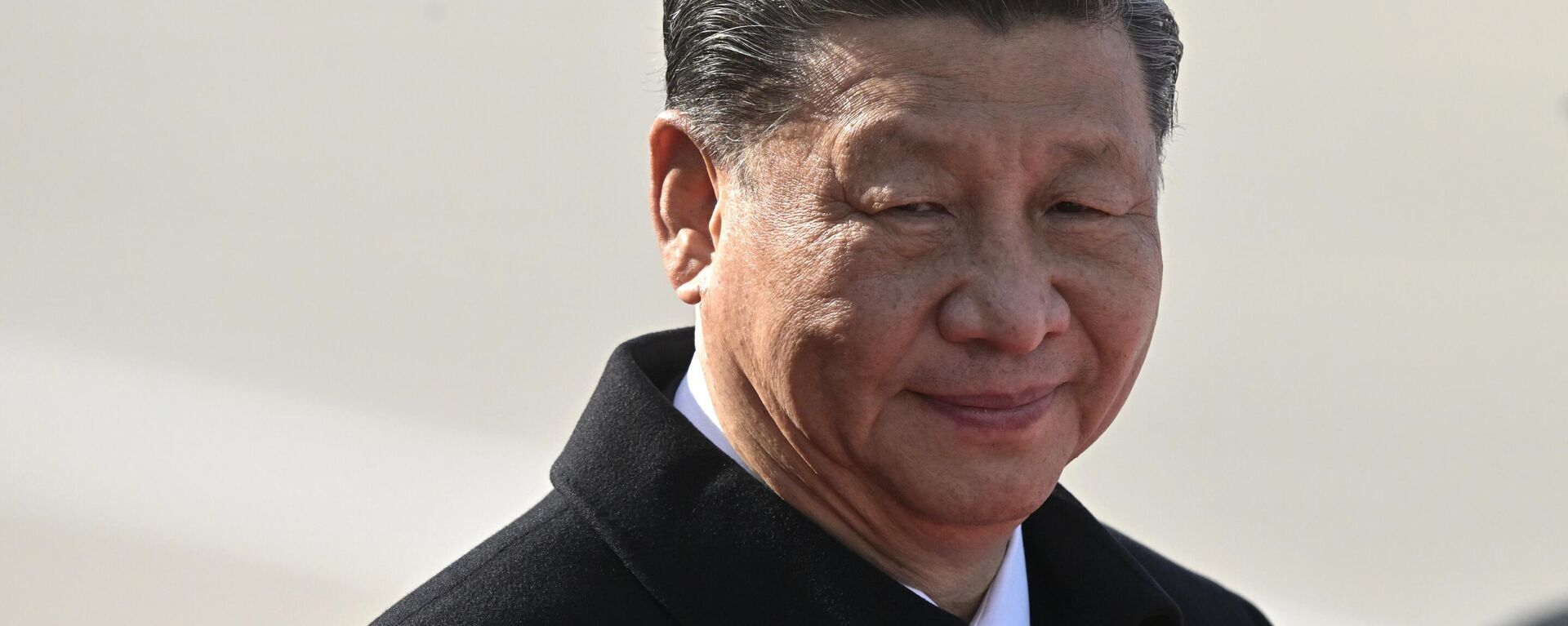
22 August 2023, 15:46 GMT
Xi Jinping: Shared Future of Humankind
Minister of Commerce of the People’s Republic of China Wang Wentao delivered remarks by Chairman Xi Jinping, underlining Beijing's vision for
the world's development and prosperity based on the idea of a shared future for all humanity.
Xi sees BRICS as a positive force for growth in contrast to the West's hegemonic approach. The Chinese leader stressed hegemonism is "not in China's DNA", and that the country strives to be on the right side of history.
Per Xi, the idea of dichotomy between "democratic" and "authoritarian" countries is detached from reality and could lead to further divisions in the world and potential clashes. The Chinese leader noted the world is facing a choice between peace and stability on the one hand, and a new Cold War on the other; between true inclusiveness and hegemony of some nations. Per Xi, hegemonism contains and disrupts development, violates the nation's right for prosperity and sovereign development.
China has learnt lessons of the two World Wars and Cold War well, according to Xi, and therefore it rejects the new "bloc" mentality and yoke of colonialism, while embracing win-win cooperation, universal security, global peace and diversity in which different civilizations are flourishing together. The Chinese leader particularly cited the nation's Global Security Initiative.
The document, which was published in late February, lays out practical measures to address current security challenges and maintain peace around the world. According to Xi, a whopping 100 countries have already supported China's vision for global security and futility of zero-sum games.
The Chinese chairman particularly
hailed the idea of BRICS expansion, stressing that 20 countries have already applied for membership and many more are welcome to join in order to facilitate mutual development. For its part, China is open for cooperation with its vast market and unique investment opportunities. Per Xi, China is ready to contribute more for the world and will not be curtailed on its path to a common bright future.
What's Behind the Messages of World Leaders?
"I think it may be too early to draw final conclusions with regard to some of the most critical items on the agenda, including such themes as the enlargement of BRICS," professor Yaroslav Lissovolik, founder of "BRICS+ Analytics", told Sputnik. "But the bottom line from the speeches is that there is an important degree of consolidation and unanimity within the BRICS bloc on some of the key issues in the world economy and global development. And I think the speeches of the leaders, they basically affirm that commonality of vision, which is critical for BRICS. And I think that message that comes across from these statements was very important and a very important signal to the outside world."
The 15th BRICS Summit kicked off in the South African capital of Johannesburg on August 22, becoming the largest-ever gathering of foreign leaders and representatives from the world's emerging economies. This year, the invitation to attend the summit has been extended to 67 heads of countries, including 53 from Africa, as well as Cuba, Bolivia, Bangladesh, Indonesia and Iran, among the others.
BRICS is an acronym for Brazil, Russian Federation, India, China, and South Africa, which together represent over 40% of the world's population and over 31% of the GDP. The nations are expected to discuss the expansion of BRICS – as more than 40 states expressed desire to join the club with over 20 countries having officially applied for BRICS membership – the switch from the US dollar to national currencies in mutual financial operations, new business opportunities, infrastructure development and global geopolitics.
"I think it's a possibility in terms of BRICS increasingly taking on more functions, more capabilities. It is hard to say at what stage BRICS will start to become more of an organization rather than a club or a grouping of countries with common interests. I don't think that there is an urgent necessity at this stage to create a formal organizational structure of BRICS. And what is more important is to have various mechanisms of cooperation, multi-modal mechanisms, I would call them, a 'BRICS+'-type mechanisms vis-a-vis the other countries of the Global South," Lissovolik underscored.

